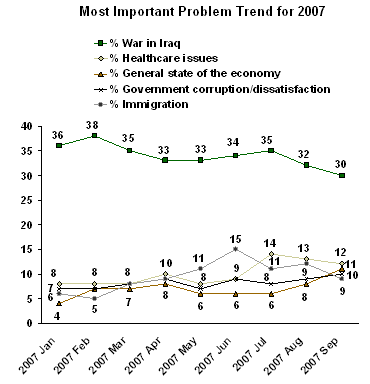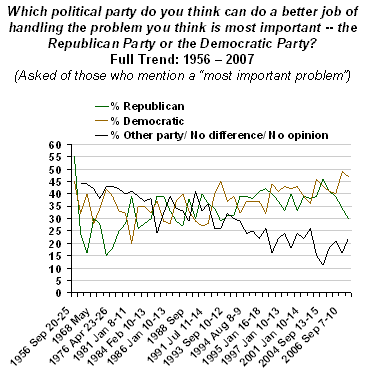GALLUP NEWS SERVICE
PRINCETON, NJ -- Three in 10 Americans say that the war in Iraq is the most important problem facing the country -- now at its lowest point since last October. Americans are much more likely to say they trust the Democratic Party rather than the Republican Party to handle the nation's top problem; earlier in the Bush presidency, Americans were equally likely to trust the two parties.
The war in Iraq is the most important problem in the minds of Republicans and Democrats, although Democrats mention the war much more frequently than Republicans do. The vast majority of Republicans and Democrats say they trust their own party to better handle the nation's top problem, but Republicans' level of trust in their own party is at its lowest point since President George W. Bush was elected president.
Most Important Problem
The Sept. 14-16, 2007, poll provided Gallup's monthly update of the long-standing question that asks Americans to name, in their own words, the most important problem facing the country at this time. The war in Iraq continues to be the dominant problem in the eyes of the public, named by 30% of Americans. Following next are healthcare issues (12%), the general state of the economy (11%), government corruption and dissatisfaction (10%), and immigration (9%). Between 3% and 5% of Americans mention terrorism, ethics and morality, education, poverty and homelessness, and the environment.
|
What do you think is the most important problem facing this country today? |
|
|
2007 Sep 14-16 |
|
|
% |
|
|
ECONOMIC PROBLEMS (NET) |
25 |
|
Economy in general |
11 |
|
Unemployment/jobs |
4 |
|
Fuel/Oil Prices |
3 |
|
Lack of money |
3 |
|
Federal budget deficit/federal debt |
2 |
|
High cost of living/inflation |
2 |
|
Taxes |
1 |
|
Foreign trade/trade deficit |
1 |
|
Corporate corruption |
1 |
|
Gap between rich and poor |
1 |
|
Wage issues |
* |
|
|
|
|
NON-ECONOMIC PROBLEMS (NET) |
83 |
|
Situation in Iraq/war |
30 |
|
Poor health care/ hospitals; high cost of health care |
12 |
|
Dissatisfaction with government/ Congress/ politicians; poor leadership; corruption; abuse of power |
10 |
|
Immigration/illegal aliens |
9 |
|
Terrorism |
5 |
|
Ethics/moral/religious/family decline; dishonesty; lack of integrity |
5 |
|
Education/poor education/access to education |
4 |
|
Poverty/ hunger/ homelessness |
4 |
|
Environment/ pollution |
3 |
|
Lack of respect for each other |
2 |
|
Foreign aid/focus overseas |
2 |
|
Crime/violence |
2 |
|
National security |
2 |
|
Unifying the country |
2 |
|
Lack of energy sources; the energy crisis |
1 |
|
Judicial system/courts/laws |
1 |
|
Drugs |
1 |
|
Election year/presidential choices/election reform |
1 |
|
International issues/ problems |
1 |
|
Homosexuality/gay rights issues |
1 |
|
The media |
* |
|
Welfare |
* |
|
Social Security |
* |
|
Children's behavior/way they are raised |
* |
|
Medicare |
* |
|
Abortion |
* |
|
Lack of military defense |
* |
|
War in the Middle East |
* |
|
Overpopulation |
* |
|
Care for the elderly |
* |
|
Race relations/ racism |
* |
|
Guns/gun control |
* |
|
Natural disaster relief effort and funding |
* |
|
|
|
|
Other non-economic |
4 |
|
|
|
|
No opinion |
2 |
|
|
|
|
Note: Percentages add to more than 100% due to multiple responses. |
|
Americans have been most likely to mention Iraq as the nation's top problem since the spring of 2004, but there have been modest variations in the percentage naming it in recent months.

Americans' perceptions that Iraq is the nation's most important problem have gradually declined over the past two months and are now at the lowest point so far this year. In July, 35% of Americans said Iraq was the top problem, followed by 32% in August, and 30% in the latest poll. (The two percentage point decrease since last month falls within the poll's margin of error.) The last time the percentage naming Iraq as the nation's top problem was lower than it is now was in October 2006 -- when 28% said the war was the top problem. Views that Iraq was the nation's most important problem were most prevalent this year in February, at 38%, also the highest since the war began.
The percentage of Americans naming healthcare issues, the economy, and government corruption and dissatisfaction as the most important problems facing this country has shown slight increases recently, but these increases are not significantly higher than they were in recent months. Views that immigration is the nation's top problem peaked in June, at 15%, and have gradually declined since then, with 9% now saying it is their top concern.
An analysis of an aggregated sample of more than 3,000 interviews conducted in July, August, and September 2007 shows that Iraq remains the top problem regardless of party identification. However, the percentage of each partisan group naming Iraq does vary significantly, from 42% of Democrats to 31% among independents and 26% among Republicans. Democrats (16%) are also more likely than Republicans (11%) to say healthcare is the top problem.
Republicans, meanwhile, are more inclined than Democrats to mention immigration (15% vs. 5%, respectively), terrorism (10% vs. 2%), and ethics and morality (8% vs. 5%) as the most important problems facing the country.
The party groups are roughly equally likely to say the economy, government corruption, education, poverty, and unemployment are the nation's top problems.
|
Most Important Problem Facing the Country
|
|||
|
Repub-
|
Indepen-
|
Demo-
|
|
|
% |
% |
% |
|
|
Situation in Iraq |
26 |
31 |
42 |
|
Immigration/illegal immigration |
15 |
12 |
5 |
|
Healthcare issues |
11 |
11 |
16 |
|
Terrorism |
10 |
5 |
2 |
|
Ethics/morality/family decline |
8 |
3 |
3 |
|
General state of the economy |
7 |
9 |
9 |
|
Government dissatisfaction and corruption |
7 |
12 |
8 |
|
Education |
3 |
4 |
4 |
|
Poverty/hunger/homelessness |
3 |
3 |
3 |
|
Unemployment/jobs |
2 |
4 |
5 |
Republicans vs. Democrats as Better Party to Handle the Most Important Problem
The latest poll also asked those who mention a problem whether the Republican Party or the Democratic Party can do a better job of handling that problem.
Americans are much more likely to say that the Democratic Party (47%) rather than the Republican Party (30%) would do a better job handling the problem they think is most important. Twenty-two percent volunteer that it makes no difference, that another party could better handle it, or offer no opinion. Those who say Iraq is the nation's most important problem are twice as likely to say the trust the Democratic Party rather than the Republican Party to handle the war.
These results are quite similar to those Gallup recorded in 2006, but between 2001 and 2005, Americans were about equally likely to say they trusted the Democratic Party to handle the nation's top problem as they were to say they trusted the Republican Party.

Since Gallup first asked this question in 1956, the "party best able to handle" results have shown substantial fluctuation. In 1956, Americans were more inclined to say they trusted Republicans rather than Democrats to handle the nation's top problem, which at that time involved concerns about war, international aid, and racism.
Then, from 1960 through 1984 (with the exception of one poll in 1968), Americans expressed more trust in the Democratic Party rather than Republican Party to handle the nation's top problem, with between 37% and 44% not offering an opinion. Republicans were more trusted than Democrats were from 1984 through 1986, and throughout much of George H.W. Bush's presidency, until the 1992 presidential election got under way when Americans expressed greater trust in the Democrats. Republicans were more trusted than Democrats again in 1994, when Republicans eventually took over control of both houses of Congress in the midterm elections that year, and both parties were equally trusted earlier in the current Bush administration.

The vast majority of Republicans (73%) and Democrats (86%) say they trust their own party to do a better job handling the most important problem. Since 2001, there has been little change in Democrats' view of which party they trust to handle the nation's top problem, with the exception of a 2002 poll where this sentiment dipped to 74%, most likely due to the aftermath of the 9/11 terrorist attacks. Republicans, however, are much less likely to trust their party now than at any other time since Bush was elected president. Since 2004, independents have shown more trust in the Democratic Party rather than the Republican Party, with a significant percentage not offering an opinion. Prior to that, independents were equally likely to trust the two parties on this issue.
|
Party Better to Handle the Most Important Problem
|
||||||
|
Republicans |
Independents |
Democrats |
||||
|
Trust Reps. |
Trust Dems. |
Trust Reps. |
Trust Dems. |
Trust Reps. |
Trust Dems. |
|
|
% |
% |
% |
% |
% |
% |
|
|
2007 Sep 14-16 |
73 |
10 |
22 |
41 |
4 |
86 |
|
2006 Sep 7-10 |
84 |
6 |
24 |
46 |
3 |
88 |
|
2005 Sep 12-15 |
89 |
3 |
28 |
32 |
4 |
87 |
|
2005 Jan 3-5 |
86 |
4 |
24 |
37 |
7 |
84 |
|
2004 Sep 13-15 |
93 |
3 |
33 |
47 |
9 |
87 |
|
2004 Jan 12-15 |
86 |
8 |
29 |
41 |
5 |
86 |
|
2002 Jul 26-28 |
84 |
7 |
28 |
26 |
5 |
74 |
|
2001 Jan 10-14 |
84 |
5 |
28 |
30 |
4 |
81 |
Survey Methods
Results are based on telephone interviews with 1,010 national adults, aged 18 and older, conducted Sept. 14-16, 2007. For results based on the total sample of national adults, one can say with 95% confidence that the margin of sampling error is ±3 percentage points. In addition to sampling error, question wording and practical difficulties in conducting surveys can introduce error or bias into the findings of public opinion polls.
